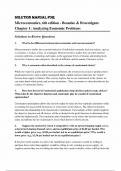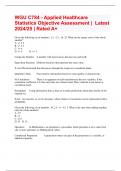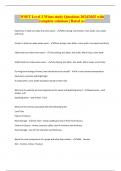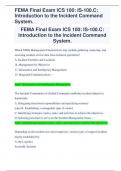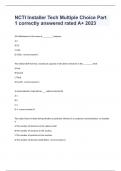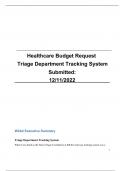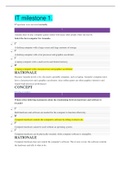TEST BANK FOR
pathophysiology 7th edition
by jacquelyn l. banasik phd arnp (author)
, Table Of Contents
Chapter 01: Introduction To Pathophysiology ...........................................................................................................................4
Chapter 02: Homeostasis, Allostasis, And Adaptive Responses To Stressors............................................................................7
Chapter 03: Cell Structure And Function .................................................................................................................................10
Chapter 04: Cell Injury, Aging, And Death .............................................................................................................................15
Chapter 05: Genome Structure, Regulation, And Tissue Differentiation .................................................................................20
Chapter 06: Genetic And Developmental Disorders ................................................................................................................23
Chapter 07: Neoplasia ..............................................................................................................................................................27
Chapter 08: Infectious Processes .............................................................................................................................................32
Chapter 09: Inflammation And Immunity................................................................................................................................35
Chapter 10: Alterations In Immune Function ..........................................................................................................................39
Chapter 11: Malignant Disorders Of White Blood Cells .........................................................................................................45
Chapter 12: Hiv Disease And Aids ..........................................................................................................................................51
Chapter 13: Alterations In Oxygen Transport ..........................................................................................................................57
Chapter 14: Alterations In Hemostasis And Blood Coagulation..............................................................................................65
Chapter 15: Alterations In Blood Flow ....................................................................................................................................71
Chapter 16: Alterations In Blood Pressure...............................................................................................................................78
Chapter17:Cardiac Function ....................................................................................................................................................84
Chapter 18: Alterations In Cardiac Function .....................................................................................................................91
Chapter 19: Heart Failure And Dysrhythmias: Common Sequelae Of Cardiac Diseases .........................................................97
Chapter 20: Shock .................................................................................................................................................................. 106
Chapter 21: Respiratory Function And Alterations In Gas Exchange.................................................................................... 114
Chapter 22: Obstructive Pulmonary Disorders ...................................................................................................................... 119
Chapter 23: Restrictive Pulmonary Disorders .................................................................................................................... 127
Chapter 24: Fluid And Electrolyte Homeostasis And Imbalances ..................................................................................... 140
Chapter 25: Acid–Base Homeostasis And Imbalances ...................................................................................................... 157
Chapter 26: Renal Function ............................................................................................................................................... 167
Chapter 27: Intrarenal Disorders ........................................................................................................................................ 174
Chapter 28: Acute Kidney Injury And Chronic Kidney Disease ....................................................................................... 189
Chapter 29: Disorders Of The Lower Urinary Tract .......................................................................................................... 205
Chapter 30: Male Genital And Reproductive Function ......................................................................................................... 217
Chapter 31: Alterations In Male Genital And Reproductive Function................................................................................... 222
Chapter 32: Female Genital And Reproductive Function ...................................................................................................... 227
Chapter 33: Alterations In Female Genital And Reproductive Function ............................................................................... 233
Chapter 34: Sexually Transmitted Infections ..................................................................................................................... 242
Chapter 35: Gastrointestinal Function ............................................................................................................................... 248
Chapter 36: Gastrointestinal Disorders .............................................................................................................................. 257
Chapter 37: Alterations In Function Of The Gallbladder And Exocrine Pancreas ............................................................. 269
Chapter 38: Liver Diseases ................................................................................................................................................ 278
Chapter 39: Endocrine Physiology And Mechanisms Of Hypothalamic-Pituitary Regulation .......................................... 286
Chapter 40: Disorders Of Endocrine Function................................................................................................................... 296
Chapter 41: Diabetes Mellitus............................................................................................................................................ 308
Chapter 42: Alterations In Metabolism And Nutrition ...................................................................................................... 317
Chapter 43: Structure And Function Of The Nervous System........................................................................................... 323
, Chapter 44: Acute Disorders Of Brain Function................................................................................................................ 336
Chapter 45: Chronic Disorders Of Neurologic Function ................................................................................................... 349
Chapter 46: Alterations In Special Sensory Function ........................................................................................................ 360
Chapter 47: Pain................................................................................................................................................................. 366
Chapter 48: Neurobiology Of Psychotic Illnesses ............................................................................................................. 372
Chapter 49: Neurobiology Of Nonpsychotic Illnesses ....................................................................................................... 382
Chapter 50: Structure And Function Of The Musculoskeletal System .............................................................................. 391
Chapter 51: Alterations In Musculoskeletal Function: Trauma, Infection, And Disease ....................................................... 399
Chapter 52: Alterations In Musculoskeletal Function: Rheumatic Disorders......................................................................... 407
Chapter 53: Alterations In The Integumentary System .......................................................................................................... 414
Chapter 54: Burn Injuries....................................................................................................................................................... 420
, Chapter 01: Introduction To
Pathophysiology
Banasik: Pathophysiology, 7th Edition
Multiple Choice
1. C.Q. Was Recently Exposed To Group A Hemolytic Streptococcus And Subsequently
Developed A Pharyngeal Infection. His Clinic Examination Reveals An Oral Temperature Of
102.3°F, Skin Rash, Dysphagia, And Reddened Throat Mucosa With Multiple Pustules. He
Complains Of Sore Throat, Malaise, And Joint Stiffness. A Throat Culture Is Positive For
Streptococcus, And Antibiotics Have Been Prescribed. The Etiology Of C.Q.’S Disease Is
a. A Sore Throat.
b. Streptococcal Infection.
c. Genetic Susceptibility.
d. Pharyngitis.
Answer: B
Etiology Refers To The Proposed Cause Or Causes Of A Particular Disease Process. A Sore
Throat Is The Manifestation Of The Disease Process. Genetic Susceptibility Refers To
Inherited Tendency To Develop A Disease. Pharyngitis Refers To Inflammation Of The
Throat And Is Also A Clinical Manifestation Of The Disease Process.
2. A 17-Year-Old College-Bound Student Receives A Vaccine Against An Organism That
Causes Meningitis. This Is An Example Of
a. Primary Prevention.
b. Secondary Prevention.
c. Tertiary Prevention.
d. Disease Treatment.
Answer: A
Primary Prevention Is Prevention Of Disease By Altering Susceptibility Or Reducing
Exposure For Susceptible Individuals, In This Case By Providing Vaccination. Secondary
Prevention Is The Early Detection, Screening, And Management Of The Disease. Tertiary
Prevention Includes Rehabilitative And Supportive Care And Attempts To Alleviate
Disability And Restore Effective Functioning. Disease Treatment Involves Management Of
The Disease Once It Has Developed.
3. An Obese But Otherwise Healthy Teen Is Given A Prescription For A Low-Calorie Diet And
Exercise Program. This Is An Example Of
a. Primary Prevention.
b. Secondary Prevention.
c. Tertiary Prevention.
d. Disease Treatment.
Answer: B
Secondary Prevention Is The Early Detection, Screening, And Management Of The Disease
Such As Prescribing Diet And Exercise For An Individual Who Has Already Developed
Obesity. Primary Prevention Is Prevention Of Disease By Altering Susceptibility Or
Reducing Exposure For Susceptible Individuals. Tertiary Prevention Includes Rehabilitative
And Supportive Care And Attempts To Alleviate Disability And Restore Effective
Functioning. Disease Treatment Involves Management Of The Disease Once It Has
Developed.
pathophysiology 7th edition
by jacquelyn l. banasik phd arnp (author)
, Table Of Contents
Chapter 01: Introduction To Pathophysiology ...........................................................................................................................4
Chapter 02: Homeostasis, Allostasis, And Adaptive Responses To Stressors............................................................................7
Chapter 03: Cell Structure And Function .................................................................................................................................10
Chapter 04: Cell Injury, Aging, And Death .............................................................................................................................15
Chapter 05: Genome Structure, Regulation, And Tissue Differentiation .................................................................................20
Chapter 06: Genetic And Developmental Disorders ................................................................................................................23
Chapter 07: Neoplasia ..............................................................................................................................................................27
Chapter 08: Infectious Processes .............................................................................................................................................32
Chapter 09: Inflammation And Immunity................................................................................................................................35
Chapter 10: Alterations In Immune Function ..........................................................................................................................39
Chapter 11: Malignant Disorders Of White Blood Cells .........................................................................................................45
Chapter 12: Hiv Disease And Aids ..........................................................................................................................................51
Chapter 13: Alterations In Oxygen Transport ..........................................................................................................................57
Chapter 14: Alterations In Hemostasis And Blood Coagulation..............................................................................................65
Chapter 15: Alterations In Blood Flow ....................................................................................................................................71
Chapter 16: Alterations In Blood Pressure...............................................................................................................................78
Chapter17:Cardiac Function ....................................................................................................................................................84
Chapter 18: Alterations In Cardiac Function .....................................................................................................................91
Chapter 19: Heart Failure And Dysrhythmias: Common Sequelae Of Cardiac Diseases .........................................................97
Chapter 20: Shock .................................................................................................................................................................. 106
Chapter 21: Respiratory Function And Alterations In Gas Exchange.................................................................................... 114
Chapter 22: Obstructive Pulmonary Disorders ...................................................................................................................... 119
Chapter 23: Restrictive Pulmonary Disorders .................................................................................................................... 127
Chapter 24: Fluid And Electrolyte Homeostasis And Imbalances ..................................................................................... 140
Chapter 25: Acid–Base Homeostasis And Imbalances ...................................................................................................... 157
Chapter 26: Renal Function ............................................................................................................................................... 167
Chapter 27: Intrarenal Disorders ........................................................................................................................................ 174
Chapter 28: Acute Kidney Injury And Chronic Kidney Disease ....................................................................................... 189
Chapter 29: Disorders Of The Lower Urinary Tract .......................................................................................................... 205
Chapter 30: Male Genital And Reproductive Function ......................................................................................................... 217
Chapter 31: Alterations In Male Genital And Reproductive Function................................................................................... 222
Chapter 32: Female Genital And Reproductive Function ...................................................................................................... 227
Chapter 33: Alterations In Female Genital And Reproductive Function ............................................................................... 233
Chapter 34: Sexually Transmitted Infections ..................................................................................................................... 242
Chapter 35: Gastrointestinal Function ............................................................................................................................... 248
Chapter 36: Gastrointestinal Disorders .............................................................................................................................. 257
Chapter 37: Alterations In Function Of The Gallbladder And Exocrine Pancreas ............................................................. 269
Chapter 38: Liver Diseases ................................................................................................................................................ 278
Chapter 39: Endocrine Physiology And Mechanisms Of Hypothalamic-Pituitary Regulation .......................................... 286
Chapter 40: Disorders Of Endocrine Function................................................................................................................... 296
Chapter 41: Diabetes Mellitus............................................................................................................................................ 308
Chapter 42: Alterations In Metabolism And Nutrition ...................................................................................................... 317
Chapter 43: Structure And Function Of The Nervous System........................................................................................... 323
, Chapter 44: Acute Disorders Of Brain Function................................................................................................................ 336
Chapter 45: Chronic Disorders Of Neurologic Function ................................................................................................... 349
Chapter 46: Alterations In Special Sensory Function ........................................................................................................ 360
Chapter 47: Pain................................................................................................................................................................. 366
Chapter 48: Neurobiology Of Psychotic Illnesses ............................................................................................................. 372
Chapter 49: Neurobiology Of Nonpsychotic Illnesses ....................................................................................................... 382
Chapter 50: Structure And Function Of The Musculoskeletal System .............................................................................. 391
Chapter 51: Alterations In Musculoskeletal Function: Trauma, Infection, And Disease ....................................................... 399
Chapter 52: Alterations In Musculoskeletal Function: Rheumatic Disorders......................................................................... 407
Chapter 53: Alterations In The Integumentary System .......................................................................................................... 414
Chapter 54: Burn Injuries....................................................................................................................................................... 420
, Chapter 01: Introduction To
Pathophysiology
Banasik: Pathophysiology, 7th Edition
Multiple Choice
1. C.Q. Was Recently Exposed To Group A Hemolytic Streptococcus And Subsequently
Developed A Pharyngeal Infection. His Clinic Examination Reveals An Oral Temperature Of
102.3°F, Skin Rash, Dysphagia, And Reddened Throat Mucosa With Multiple Pustules. He
Complains Of Sore Throat, Malaise, And Joint Stiffness. A Throat Culture Is Positive For
Streptococcus, And Antibiotics Have Been Prescribed. The Etiology Of C.Q.’S Disease Is
a. A Sore Throat.
b. Streptococcal Infection.
c. Genetic Susceptibility.
d. Pharyngitis.
Answer: B
Etiology Refers To The Proposed Cause Or Causes Of A Particular Disease Process. A Sore
Throat Is The Manifestation Of The Disease Process. Genetic Susceptibility Refers To
Inherited Tendency To Develop A Disease. Pharyngitis Refers To Inflammation Of The
Throat And Is Also A Clinical Manifestation Of The Disease Process.
2. A 17-Year-Old College-Bound Student Receives A Vaccine Against An Organism That
Causes Meningitis. This Is An Example Of
a. Primary Prevention.
b. Secondary Prevention.
c. Tertiary Prevention.
d. Disease Treatment.
Answer: A
Primary Prevention Is Prevention Of Disease By Altering Susceptibility Or Reducing
Exposure For Susceptible Individuals, In This Case By Providing Vaccination. Secondary
Prevention Is The Early Detection, Screening, And Management Of The Disease. Tertiary
Prevention Includes Rehabilitative And Supportive Care And Attempts To Alleviate
Disability And Restore Effective Functioning. Disease Treatment Involves Management Of
The Disease Once It Has Developed.
3. An Obese But Otherwise Healthy Teen Is Given A Prescription For A Low-Calorie Diet And
Exercise Program. This Is An Example Of
a. Primary Prevention.
b. Secondary Prevention.
c. Tertiary Prevention.
d. Disease Treatment.
Answer: B
Secondary Prevention Is The Early Detection, Screening, And Management Of The Disease
Such As Prescribing Diet And Exercise For An Individual Who Has Already Developed
Obesity. Primary Prevention Is Prevention Of Disease By Altering Susceptibility Or
Reducing Exposure For Susceptible Individuals. Tertiary Prevention Includes Rehabilitative
And Supportive Care And Attempts To Alleviate Disability And Restore Effective
Functioning. Disease Treatment Involves Management Of The Disease Once It Has
Developed.


